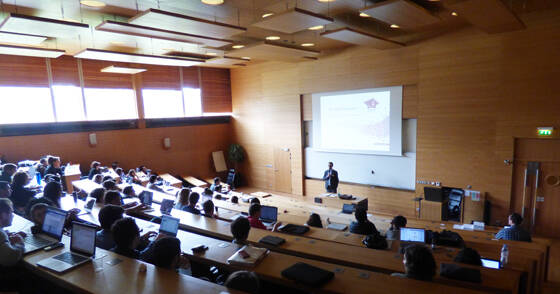Capgemini CEO explains why big firms desire to go digital at HEC Paris event
During his keynote speech on the HEC Paris campus, Capgemini Consulting France’s CEO Patrick Ferraris explained how many large firms are being forced to go digital to compete against smaller disruptive technology-savvy niche companies. Digital transformation covers most industries and is spread across all departments, said the businessman, and Capgemini helps its clients put in place and implement a digital strategy – fast.

Patrick Ferraris began his keynote speech at HEC Paris on Wednesday by announcing he was naked – that is to say devoid of any slides during his talk. However the speech was not devoid of substance. As CEO of Capgemini Consulting France, Ferraris talked about its exciting projects and the journey the firm has made since focusing solely on digital just six years ago. His speech was part of a ‘Capgemini digital day’ on campus for Master students on the Digital Transformation Certificate. The day’s events included workshops, all dedicated to digital transformation.
Throughout the talk, Ferraris cited many examples of big companies the digital consultancy firm is working with. One such partnership is with automotive manufacturer Valeo to replace the car key with the mobile phone. He explained that his consulting firm is helping the company build a business model around a device fitted in the car and the technology behind, which is aimed at businesses owning a fleet of cars. Currently La Poste is managing 100,000 cars every day in France, and Europcar 200,000 every day, he said. Using their business model, they will get paid on how many cars are connected, he added. “You could therefore go straight to your [hire] car, receive an SMS on your phone and drive off. This would save companies money,” said Ferraris.
The businessman explained that Capgemini focuses its consulting work entirely on the digital field, helping big firms to put in place a digital strategy and improve revenues as a result. “We want to take large global organisations into the digital world,” said Ferraris. Engie, he said, is investing 1.5 billion to put digital at the core of its user experience. Schneider Electric boss Jean-Pascal Tricoire is also investing several hundred million euros into digital as the firm is trying to move from a product-based to a service-based business, explained the businessman. “Digital is the way to do that when clients are changing and so is the world,” he said.
So why are so many deciding to go digital? “Technology, while it was seen as a nightmare ten years ago, is now part of our lives, even fashionable,” said Ferraris. He explained that employees and consumers are constantly talking to friends about brands. This means that large corporations have begun to see the necessity to invest in employee – as well as consumer – experience, so that at work they are comfortable and, for instance, have a fast enough computer to help them perform. Finally, said Ferraris, many big players are being disrupted by smaller technology firms that have a good understanding of consumer vision, and specific knowledge of and access to technology.
With this in mind, Capgemini decided to invest massively in digital and in 2011 it created a partnership with the Massachusetts Institute of Technology (MIT). “We chose MIT because we are a global organisation that is mostly European and MIT is global but American.” The new partners then set about researching how large global organizations are going digital to understand the key success factors. A digital transformation can affect any industry, although today we are seeing it increasingly impact the business to consumer (B to C) industries, explained Ferraris. Automotive parts supplier Faurecia, for instance, is investing massively in digital to streamline the design, manufacture and distribution of its products (exhaust pipes, dashboards etc.). “Digital therefore affects all industries and all functions,” said Ferraris, “so any sector you choose will be massively disrupted by digital.”
By assessing the companies that have brought about a digital transformation successfully, Capgemini found that only about ten to 15 percent of companies have done so successfully. “All share the same DNA,” said the businessman. All had a visionary leader who drove the company forward into the digital age, and such a transformation works best from the top-down, Ferraris explained. Another factor that led to success was by getting everyone on board and believing that a transformation made sense. The lecturer explained that this could be achieved through training and encouraging employees to challenge the status quo. Finally, there needs to be a good system of governance in place, says Ferraris, as digital passes through the whole organisation and doesn’t care for silos (departments that do not wish to share information with others.)
Capgemini also calls on the services of diverse talent, said Ferraris, as and when needed. For instance, depending on the project, they might take on someone from Apple, Google or Facebook, while on another project they might hire an agency to design a new consumer experience, or a sociologist, explained the CEO. “Sometimes a group of people from different backgrounds can come together and find a solution as often there is no single answer,” he said.
The digital consultancy firm has also learned that it is important to move fast when setting up a digital transformation. Ferraris cited the example of an insurance company that approached them last year and wanted help with its digital strategy. It wanted to go directly into consumer business and needed a strategy in place in just three months. In the event Capgemini supplied them with a strategy within the three months as well as launching the new business for them. “As well as strategy, digital is about trying and making small tests every three months,” said Ferraris. “By doing that, the company learns how to move fast in a digital world, as opposed to launching a new product over a two-year period,” he added.